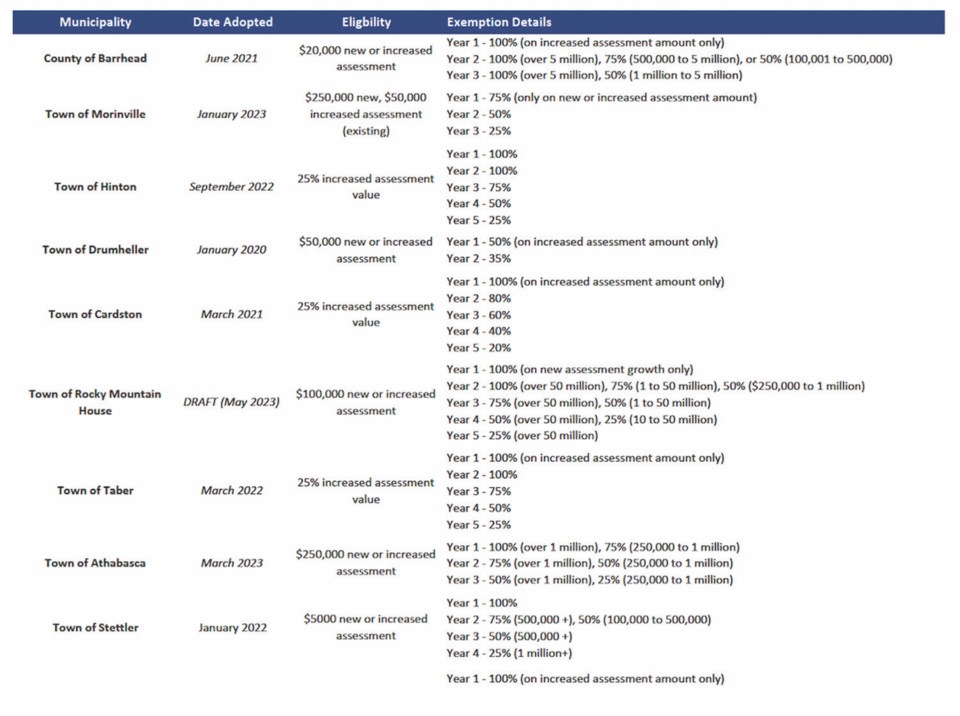WESTLOCK — A new tax incentive bylaw, expected to provide some financial relief for local businesses, will be on the table at the June 26 Town of Westlock regular council meeting.
Councillors first saw a copy of the draft bylaw at the May 15 committee of the whole (COW) meeting where CAO Simone Wiley noted they receive occasional requests for tax relief on future development and expansions — the bylaw is meant to support new developments and encourage commercial growth.
In the presentation, manager of planning and development Danielle Pougher noted it will provide new and expanding businesses with support during initial start-up or while they’re working to recoup costs following a major project.
“The bylaw would offer a tax exemption on eligible projects for a period of three years following the completion and assessment of the development,” said Pougher, noting that under the Municipal Government Act (MGA) council may provide for a full or partial exemption of taxation in order to encourage new development and revitalization of existing properties.
Mayor Ralph Leriger asked administration to identify available options for the bylaw and for development incentive. Wiley noted that depending on the type of development, there are ways a municipality can provide incentives.
“We also make sure that people who are developing have a really good understanding of what our process is,” said Wiley. “This is not something that needs to be passed in the next two weeks or in the next month or in the next six months. It’s something we should consider very carefully, about what it looks like and what the ramifications are for the community.”
Pougher also provided a list of comparable bylaws from nearby municipalities particularly towns, counties or smaller centres such as County of Barrhead, Town of Athabasca and Town of Morinville.
“This new (draft) bylaw’s been modeled after those bylaws,” explained Pouger, pointing out eligible properties under the bylaw include new, non-residential development with an assessed value of over $250,000 or the refurbishment or expansion of existing non-residential development that results in an assessed value increase of $50,000 or more.
The amount of the exemption will depend on the new assessment value, she noted, adding there is a larger exemption being proposed for projects over $1,000,000. For projects between $50,000 and $1,000,000 a 75 per cent exemption would be given in year one, 50 per cent in year two and 25 per cent in year three. For projects over $1,000,000, 100 per cent exemption is given in year one, 75 per cent in year two and 50 per cent in year three.
“It is important to note this exemption would only apply to the municipal portion of the taxes, we can’t exempt those educational and housing body portions and it would only apply to the increased assessment amount,” said Pougher, noting projects must meet certain criteria to be eligible for exemption. “That includes being up to date in current tax and utility payments, in compliance with their development and safety code permits and any other development agreements as well as any other town bylaw and having a financial status that is not in bankruptcy or receivership.”
Following Pougher’s presentation, councillors discussed the bylaw extensively, spending close to an hour asking questions and providing comments and feedback, including how other municipalities quantify success of tax incentive bylaws, the impact the bylaw would have in a small, rural community and how to measure that impact, comments noted the well researched document and comparable information from nearby municipalities, and the timing of the proposed bylaw.
Leriger asked if a tax incentive is needed and noted things for council to consider, stating, “I worry about the message that we send by doing so. I don’t think it would be fair to us to send a message that property taxes are this huge barrier to business and barrier to development,” he said. “I do not believe that that’s the truth. For development to work and business to work, you need a market but mostly you need infrastructure. Infrastructure that supports your business and your industry.” He also noted that taxes are the only source of revenue other than provincial and federal grants. “Between 20 and 25 per cent of our current assessment base is tax exempt now,” said Leriger pointing to seniors facilities, schools and churches.
“In recent years our provincial government decided that they didn’t feel like paying provincial taxes. They still want their services but they claw back all the grants in lieu of taxes …we just lost from 2022-2023, 42 per cent of our (Municipal Sustainability Initiative) MSI capital money, which goes to building infrastructure that we need to attract business.”
Coun. Randy Wold asked if it would be helpful to know what development has taken place in the last five years and what amount of taxation have they received and what would the implications be if they gave the exemptions accordingly.
“If we’re getting no development, maybe we need the incentive, but if development has been fairly strong in the last five years I’m not sure if a tax break is going to increase our development,” said Wold.
Councillors also discussed conducting a survey to gather feedback from the business community which they will discuss at the June 26 regular council meeting.



